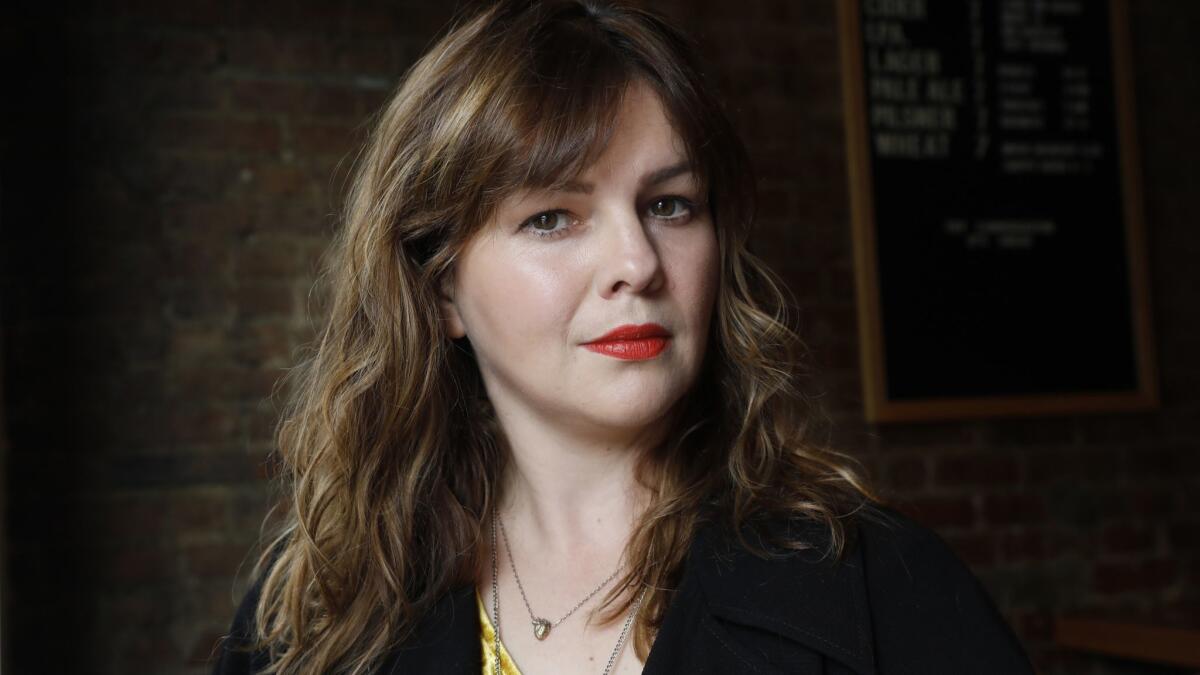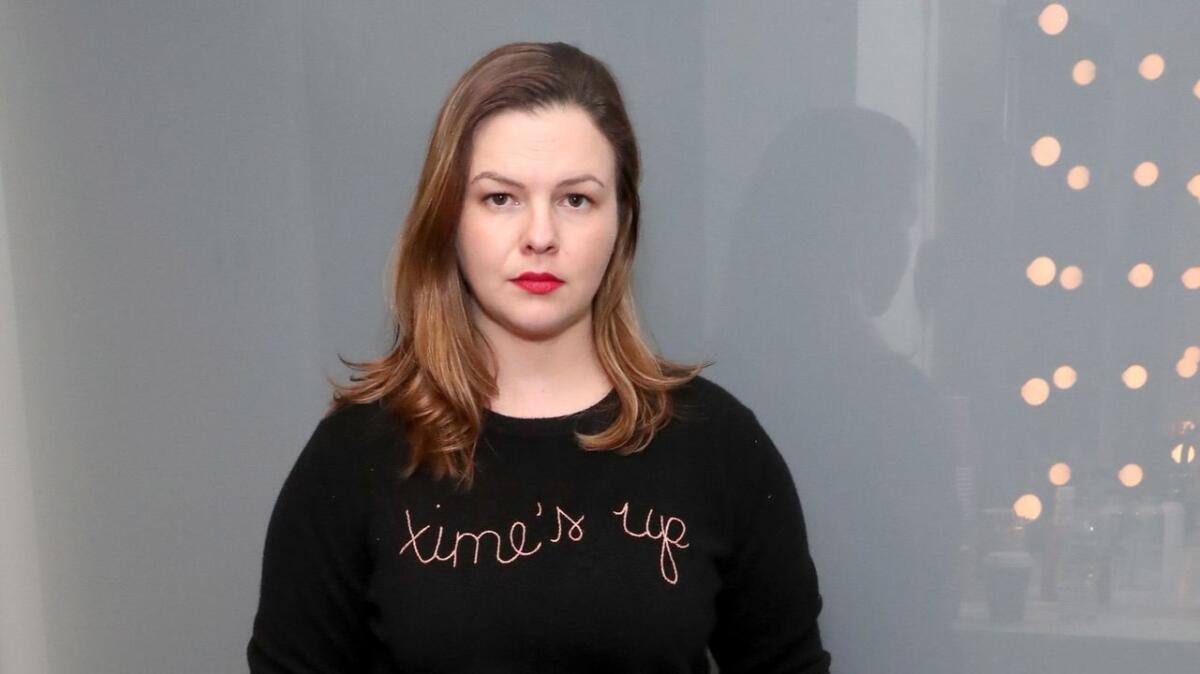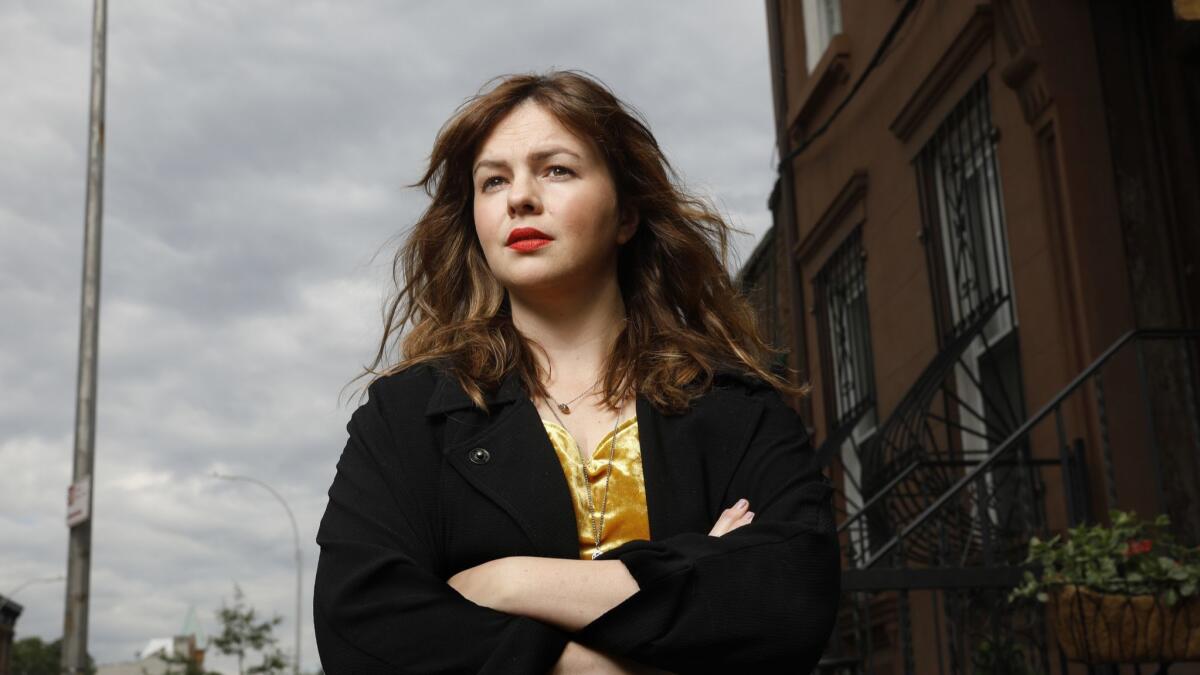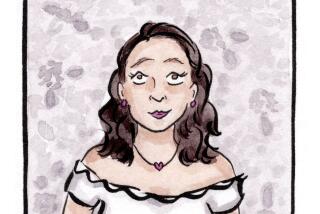Dark, feminist and fiery: Amber Tamblyn and her debut novel, ‘Any Man’

Amber Tamblyn sits across from me in her mother’s art studio, where the wood-paneled walls are populated with promotional photos and memorabilia from Tamblyn’s career, which started when she was 10 — including an adorable “Sisterhood of the Traveling Pants” poster with her character’s name (Tibby) scrawled in cursive with an exclamation mark.
But Tamblyn’s debut novel doesn’t echo the surroundings; it gets dark. Very, very dark. “Any Man” (out June 26 from HarperPerennial) tracks the criminal exploits of a female serial rapist through the stories of her six victims, as they attempt to recover and live normal lives. The book is part poetry experiment, and part transtextual commentary on the media frenzy surrounding rape cases in real life.
Tamblyn, in Los Angeles visiting her parents, tells me the novel was a logical extension of her collection of poetry, “Dark Sparkler,” and 2017 directorial debut feature, “Paint It Black,” a psychological journey through pain, drugs and suicide. In “Any Man,” Tamblyn steps further into the abyss, “imagining every extreme” she could think of for her characters to have endured in the past — from excision of genitalia to forced bestiality.
What made Tamblyn ready to tackle the macabre and try to find a light in the darkness? Pregnancy.
PREGNANCY, POWER
“I think pregnancy weaponizes you and turns your mind the most feral it will ever be,” she says. This art studio we’re sitting in is something of a mother’s shrine to a daughter, fitting scenery for Tamblyn to express the immense physical and emotional shifts that happen to new parents.
“You really imagine doing things to people who would harm your child that you would never imagine,” she says, which also allowed her not to be too precious with her characters as well; they would see the worst the world had to offer, and she would trace their journeys to recovery. “Being pregnant,” she continues, “your creative peripheral vision is as wide as it would ever be.”
FORMAL INVENTION
“Any Man” is nothing if not expansive in vision. Chapters vary in form, with the closest well-known comparisons being Mark Danielewski’s “House of Leaves” or Jennifer Egan’s “A Visit From the Goon Squad.” There are even crude pen-and-ink illustrations accompanying some chapters, suggesting a little Lynda Barry or Kelly Link inside.
Tamblyn tried writing a straightforward novel. Then a poetry editor friend said, “You’re writing what you think a novel is supposed to sound like.” She got bored, started over, wrote two new chapters — one a combo of letters, poems and dialogue, the other a text-based representation of pop-up ads, dating app messaging and emails. “I just didn’t want to get bored with the writing,” she says.
Tamblyn took inspiration from her friend Rose McGowan — who was appalled that every article about her bore the face of her assailant (Harvey Weinstein) — and gave her rapist character no voice or POV, as it would have seemed more “violent” if we were allowed to see this as the rapist’s story. She began researching every day, falling down “rabbit holes” of sexual assault case histories and sensationalist TV shows, and just when she was gaining momentum on the book and finding exactly what she wanted to add to the conversation, she had to stop writing completely.
“I’ve had people ask the ramifications of going down these rabbit holes. You’d have to do an interview with my central nervous system,” she says. “It would tell you that I have continuous body pain that seized me when I was working on this book.”

She describes the molded-plastic gloves her physical therapist made for both arms, ones which would immobilize her thumbs, so she could no longer type. At six months’ pregnant, she lay down, still, and wrote the rest of the book in her head. “It was a form of torture,” she says, shaking her head.
Still, from this forced break, she was able to absorb copious amounts of media that would then inform the chapters of her book. Like a short one that’s written as a transcript of a cable-news provocateur show, modeled on “Nancy Grace,” where the four commentators callously discuss the rape case of the first victim, a man named Donald Ellis.
“I gave [that chapter] to a friend, and one of the things he said was, ‘This seems a little over the top. I just don’t feel this is what somebody would actually say.’” She bit her tongue; what she didn’t tell him was that she had watched over and over an actual “Nancy Grace” segment discussing Jane Doe of the Stanford rape trial, transcribed the episode and flipped the genders. “It is the literal verbatim experience with the gender pronoun switched.”

AND THEN THERE’S TWITTER
One of the most revelatory chapters in the book, however, is comprised solely of fictional tweets from real people and entities, like Katy Perry, CNN, HelloGiggles, Bill O’Reilly, Roxane Gay and Mike Cernovich, as though they were tweeting about the victims in the book. What’s most shocking about these is how predictable tweets are, and also: how absolutely banal the ally sentiments and how vicious the attacks. Perhaps it’s easier to ignore the insanity of the world churning out the same words again and again when the page is always refreshing. But, here, the page is permanent. One can dwell on a tweet without the noise and see for sure that something seems deeply wrong with how we communicate with one another.
“It’s the reality of our culture,” she says. “I saw an article titled something like, ‘Celebrity Tweets React to Anthony Bourdain’s Suicide.’ There’s something about social media that keeps us trapped, and it trains people like myself who are in positions of privilege and power to know that all I have to do is tweet out my thoughts and prayers, and I’ll get this many retweets, and I’ve done my work.”
Tamblyn realizes she has a larger responsibility with her fame and power, to follow speech with action, which is what drove her as a founding member of Time’s Up. She also knows that makes her a target of sorts, like when her husband David Cross participated in an interview for his show “Arrested Development” that sounded like the men were excusing abusive behavior. She understood she couldn’t be silent and made a statement on Twitter, but she assures me there have been many real-life, productive conversations as well. She says all women have had to become teachers, for better or worse, showing the men in their lives how the negative aspects of patriarchy affect every gender. “Any Man” is an extension of that teaching.
“Women’s creative work today is inherently political. We’re pushing boundaries of how to teach,” she says. “How to get people to see what they’ve chosen not to.”
Wolfe is a writer and film critic and host of the “Switchblade Sisters” podcast.
More to Read
Sign up for our Book Club newsletter
Get the latest news, events and more from the Los Angeles Times Book Club, and help us get L.A. reading and talking.
You may occasionally receive promotional content from the Los Angeles Times.






